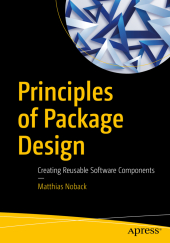 Neuerscheinungen 2018Stand: 2020-02-01 |
Schnellsuche
ISBN/Stichwort/Autor
|
Herderstraße 10
10625 Berlin
Tel.: 030 315 714 16
Fax 030 315 714 14
info@buchspektrum.de |

Matthias Noback
Principles of Package Design
Creating Reusable Software Components
1st ed. 2018. xix, 275 S. 59 SW-Abb. 254 mm
Verlag/Jahr: SPRINGER, BERLIN; APRESS 2018
ISBN: 1-484-24118-5 (1484241185)
Neue ISBN: 978-1-484-24118-9 (9781484241189)
Preis und Lieferzeit: Bitte klicken
Apply design principles to your classes, preparing them for reuse. You will use package design principles to create packages that are just right in terms of cohesion and coupling, and are user- and maintainer-friendly at the same time.
The first part of this book walks you through the five SOLID principles that will help you improve the design of your classes. The second part introduces you to the best practices of package design, and covers both package cohesion principles and package coupling principles. Cohesion principles show you which classes should be put together in a package, when to split packages, and if a combination of classes may be considered a "package" in the first place. Package coupling principles help you choose the right dependencies and prevent wrong directions in the dependency graph of your packages.
What You´ll Learn
Apply the SOLID principles of class design
Determine if classes belong in the same package
Know whether it is safe for packages to depend on each other
Who This Book Is For
Software developers with a broad range of experience in the field, who are looking for ways to reuse,share, and distribute their code
Part 1: Class Design.-
Chapter 1: The Single Responsibility Principle.-
Chapter 2: The Open/Closed Principle.-
Chapter 3: The Liskov Substitution Principle.-
Chapter 4: The Interface Segregation Principle.-
Chapter 5: The Dependency Inversion Principle.-
Part 2: Package Design.-
Chapter 6: The Release/Reuse Equivalence Principle.-
Chapter 7: The Common Reuse Principle.-
Chapter 8: The Common Closure Principle.-
Chapter 9: The Acyclic Dependencies Principle.-
Chapter 10: The Stable Dependencies Principle.-
Chapter 11: The Stable Abstractions Principle.-
Chapter 12: Conclusion.-
Appendix A: The Full Page Class.-
Matthias Noback is a professional PHP developer. He runs his own web development, training, and consultancy company called Noback´s Office. In the past, he has worked as a software developer at Driebit (Amsterdam) and IPPZ (Utrecht), and as CTO at Ibuildings (Utrecht). Since 2011 he has been regularly writing on his blog about advanced software development topics. Favorite topics include software architecture, legacy code, testing, and object design. Other books by Matthias are A Year with Symfony and Microservices for Everyone.


